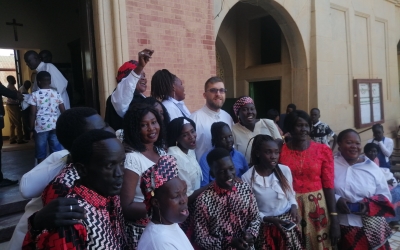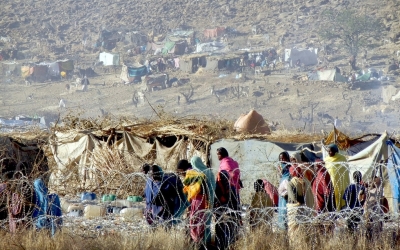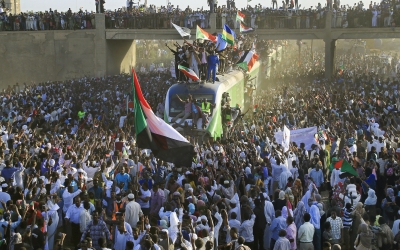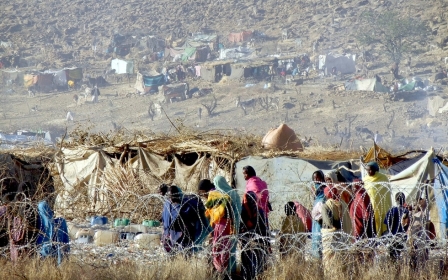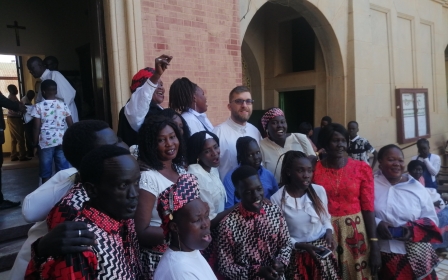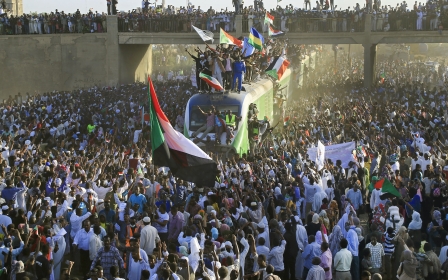Sudanese government bows to pressure and backtracks on plan to lift subsidies
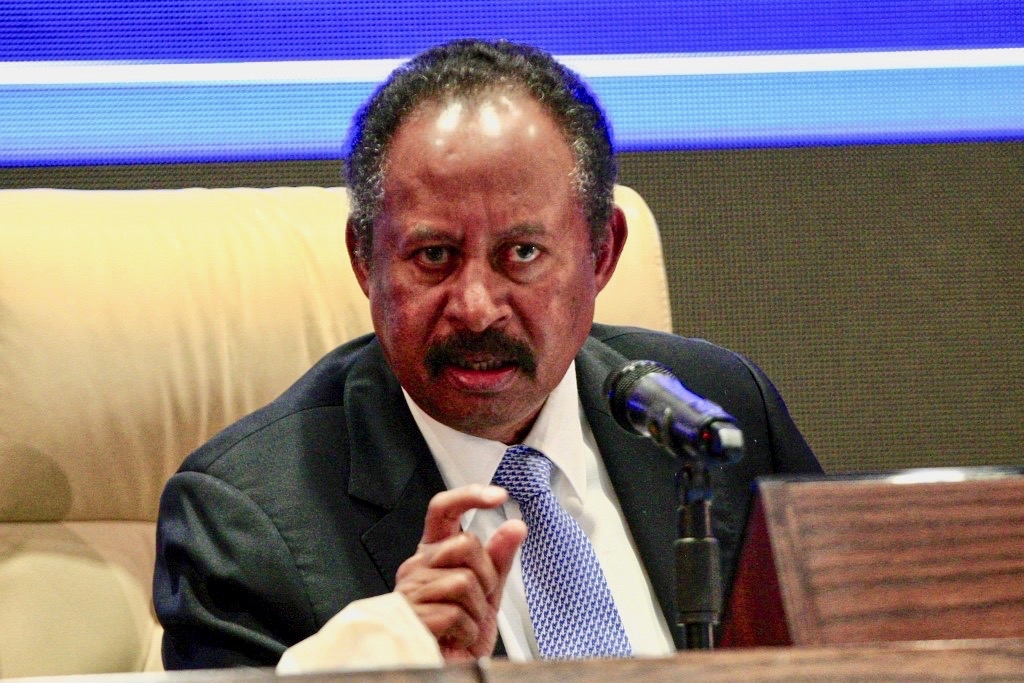
In the space of less than 24 hours, Sudan’s transitional government has backtracked on its decision to get rid of fuel subsidies in 2020 - a move that had sparked widespread anger among the country’s population and civilian representatives.
On Sunday, Sudan passed its budget for 2020 - the first since the toppling of longtime ruler Omar al-Bashir in April - but any decision on the removal of subsidies has been postponed until at least March when the country plans to hold an economic forum.
Sudanese Finance Minister Ibrahim Ahmed El Badawi announced on Friday that the cabinet had decided to remove the fuel subsidies, increase public service wages by 100 percent (the minimum wage rate currently stands at 425 Sudanese pounds, around $5 a month) and introduce an increase in subsidies for health and education services.
Badawi, who is a former expert for the World Bank in Washington, said that subsidies for benzine and gasoline would gradually be removed starting in 2020, while subsidies for bread and cooking gas will remain.
He also stated that the government would assist 900,000 poor families with payments worth at least 1,500 Sudanese pounds (around $20) each month.
However, the announcement was rejected by the Forces of Freedom and Change (FFC) and the Sudanese Professional Association (SPA), which led the protests in Sudan from December 2018 to April 2019.
After a meeting on Saturday between the council of ministers and the FFC, Faisal Mohamed Salih, the Sudanese minister of information and spokesman of the government, said: "To enable more discussions with our people, the Council of Ministers has decided to freeze the gradual lifting of the fuel subsidies until 2020 and to wait for the recommendation of an economic conference, which will be held by that time to discuss all the economic difficulties.
“We will gather the economic experts to tell us the best ways to get out [of this situation]," the minister explained.
Minister of Trade and Industry Madani Abbas added: “Despite the fact the current way of subsidies is not fair, as it goes to both the rich and poor people, we decided to give time for more consultation with our people until March 2020.”
Fragile position
The rapid reversal over the subsidies question has exposed the fragile position of the country’s new government as it set out to prepare its first budget.
After 30 years of rule marked by economic hardship, Sudan continues to struggle with a moribund economy saddled with around $60bn in foreign debt.
Coupled with its debt problems, the country remains isolated from the global financial system due to international sanctions, has seen its manufacturing sector destroyed, and faces a lack of hard currency after the loss of 70 percent of the country’s oil revenues due to the independence of South Sudan in 2011.
The exchange rate of the US dollar against the Sudanese pound has continued to rise even after the ousting of Bashir, reaching 90 pounds per dollar last week.
Meanwhile, inflation jumped from 40.3 percent in September to 60.7 percent in November, according to figures given by Sudan's Central Bureau of Statistics.
The government had announced earlier that it intended to keep the inflation rate at 27 percent.
The 2020 budget includes an overall deficit of about 73bn Sudanese pounds ($1.62bn), Badawi said on Sunday.
The budget has expected revenues of 568.3bn Sudanese pounds ($12.63bn) and also includes increased spending for healthcare and education.
IMF influence
The International Monetary Fund (IMF) has repeatedly urged Sudan to float its currency and lift subsidies on fuel, wheat and medicines in order to boost growth and investment.
Last week, the IMF office in Sudan said that Khartoum needed to take bold and comprehensive decisions, as well as reforms, to stabilise the economy and reverse the country’s declining growth.
In particular, it called on the government to support reforms and improvements in the business and governance environment.
The transitional government announced a nine-month emergency plan in October focusing on stabilising the prices of commodities, combating unemployment and restructuring the budget in addition to reforming the banking sector.
However, Badawi’s decision on Friday to lift the subsidies sparked widespread anger among pro-democracy protesters, including the youth movement and resistance committees, who threatened to once again take to the streets to protest against the 2020 budget.
“This budget would worsen the situation and continue the economic policies of the old regime which throw the burden on the citizens according to the policies of economic liberalisation, and that is unacceptable for us after the revolution,” the SPA said in a statement shared with MEE on Saturday.
“We urged the government to decrease the expenses of the public sector as well as the expenses of the military and security sectors and to increase income through the fighting of corruption and the retrieval of money stolen by the officials of the old regime and their allies.”
The FFC had also rejected the entire budget, calling for an intensive revision to its priorities and for it to be more realistic.
Negative impacts
Kamal Karar, a member of the FFC’s economic committee, told MEE that the adoption of economic liberalisation and a dependency on foreign loans and assistance would not help the collapsed economy left by Bashir.
“The donations and loans amount to more than 50 percent of the revenues of the economy and this has two serious negative impacts,” Karar argued.
“The first is the donors’ political preconditions, and the second is the lack of realism of the budget because it depends only on speculations and promises from the donors, which means the budget may collapse if there are any changes to the political agenda in the coming period.
“The lifting of the subsidies contradicts the agenda of the revolution, which calls for supporting the people’s purchasing power, tackling youth unemployment and improving access to health insurance and economic services.”
‘Unacceptable’
Members of the resistance committees had also rejected the budget, warning of more protests to bring it down.
Ahead of Saturday’s climb down, Rashid Ali, a 40-year-old member of the resistance committee in Burri, in northern Khartoum, told MEE that they had met Badawi two weeks ago and warned him not to lift the subsidies.
“It’s unacceptable after the revolution that the minister of finance has ignored our recommendations regarding the lifting of subsidies,” he stated.
Hind al-Taybe from al-Kalakla, also in Khartoum, vowed to go to the streets to bring down the cabinet of Prime Minister Hamdok if they insisted on approving the current plan.
“We are for economic reform that would put forward the right plan to combat corruption and bring back the money stolen by the old regime - not to put a heavier burden on our people,” she stressed.
Violent repression
Previous attempts at lifting subsidies sparked widespread social tensions in Sudan.
Nationwide protests in September 2013 ended with the killing of more than 200 demonstrators by Bashir’s forces.
The soaring rise in prices was the main motive of the beginning of the revolution in December 2018, when protests that started in Atbara city in the north spread to the capital Khartoum and other states.
FFC spokesman Ibrahim al-Sheikh said that the decision to freeze the lifting of the subsidies was a victory for the revolution and gave assurance to the people that the partnership between the FFC and the government remained strong.
“The meeting of today is historical as we agreed on the entire articles of the 2020 budget in a way that would not affect poor people negatively,” said Sheikh.
'This is an opportunity to resize the government'
However, economic expert Hamid Eltgani Ali criticised the actions of Hamdok’s government, emphasising the importance of setting priorities, including achieving peace and decreasing expenditure on the military and security forces.
“Hamdok needs to come up with a master plan, outline the choices in front of his government, and engage in open discussion," Ali told MEE.
“The fiscal conditions are unsustainable, how and when to conduct fiscal reform. No one wants the transition government to go and borrow like what happened in Tunisia during the transition.
“This is an opportunity to resize the government and make it more effective.
“Hamdok needs to lead the discussion because lifting the subsidies is a political issue; until now Hamdok is running the public relations side but not engaging in wider and serious policy discussion with experts and civil society.
“He is surrounded by political hacks driven by ideology and political opportunism. It is hardly to run a country by PR.
“The most important choice is to have peace and national reconciliation and restrain spending on defence and security.
“Use the peace dividend to spend on health and education, while reducing the subsidies on food and fuel over several years [rather than in one go]."
Middle East Eye delivers independent and unrivalled coverage and analysis of the Middle East, North Africa and beyond. To learn more about republishing this content and the associated fees, please fill out this form. More about MEE can be found here.


